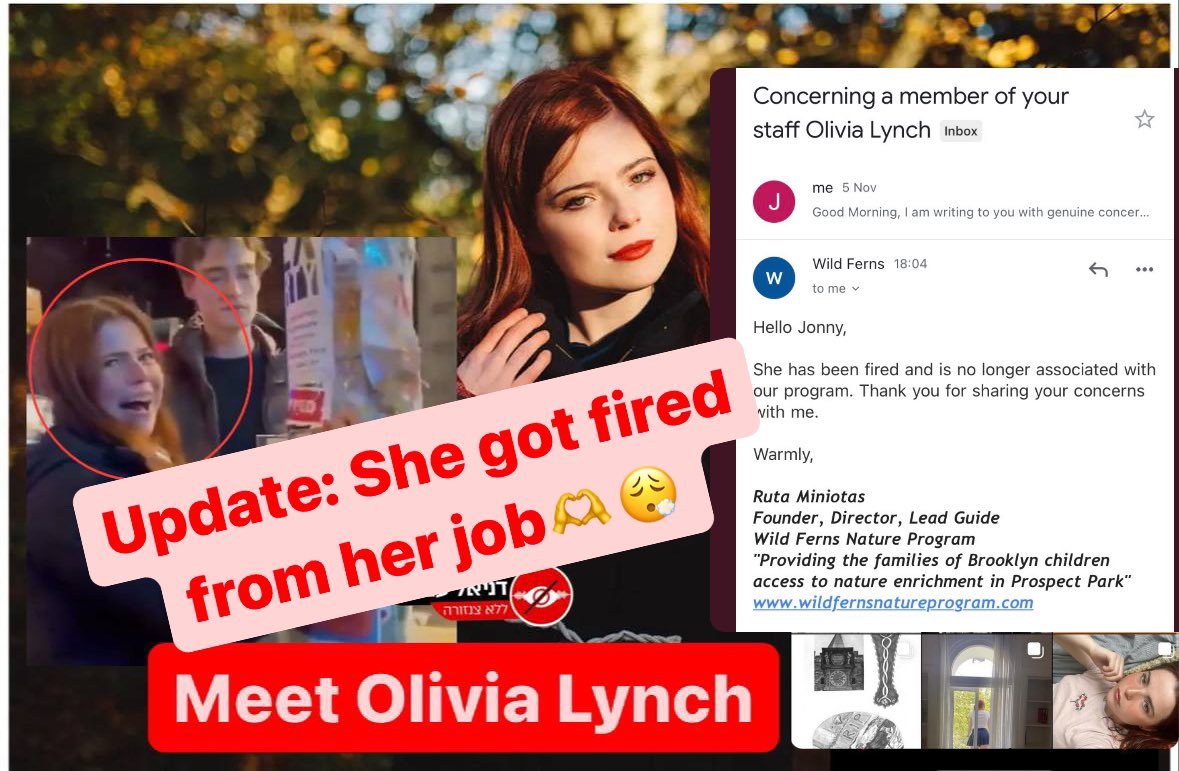The Olivia Lynch Brooklyn Posters Case: Doxxing, Free Speech, and Employment Fallout
Doxxing is the public release of private information meant to harm someone. For years, especially against reporters, police, and those advocating against issues like sexual abuse, this technique has been applied. Doxxing has lately been utilized to humiliate those who express different points of view on the Israel-Hamas conflict.
Olivia Lynch spotted a banner she had seen earlier, connected to the Hamas attack on Israel from October 7, while walking home from dinner in Brooklyn on November 2. Brooklyn, New York-based Olivia Lynch was seen on tape demolishing flags bearing prisoners under Hamas custody. Olivia was caught in Brooklyn damaging these flags, albeit originally from Portland, Oregon. Brooklyn boasts many Jewish residents.
The Israel-Hamas war has been fuelling anti-Semitism, which has resulted in more examples of individuals being singled out for their activities. On Twitter, Olivia’s video showing her taking down the flags has become popular.
What is The Case Of Olivia Lynch Brooklyn Posters?
Meet Olivia Lynch from brooklyn. another Tearing off posters of missing children’s, and finding it funny some how. the found out started. pic.twitter.com/kQ2YYr1vZL
— daniel amram – דניאל עמרם (@danielamram3) November 4, 2023
In her fourth year of displaying at Brooklyn’s Possibility Park, Olivia Lynch is a woodworker and teacher from Portland, Oregon. When asked why she was ripping down flags, she said, “F-k your publicity.” According to the Wild Greeneries Nature Program website, her mix of teaching and work allows children at Wild Plants to explore their creativity.
Brooklyn has almost half of the Jewish population living in New York City. Lynch’s performance of removing flags has sparked debate, interpreted as a kind of protest. This operation took place against the backdrop of the ongoing fight of Israel-Hamas, which has resulted in a fantastic death toll. According to the recent statement made by the Gaza Wellbeing Service, the dispute has claimed around 9,061 Palestinians, transcendingly women and children, with more than 32,000 individuals supporting the wounded.
Conversely, on the Israeli side, during the fundamental offensive of Hamas, around 1,400 people have died, primarily non-warriors. Later, especially in light of the Israel-Gaza threats, the US has seen a clear rise in prejudice towards Jews. According to FBI Chief Christopher Wray, around 60% of targeted strict-based hatred wrongdoings in the country target Jewish individuals. Similarly, the UK and France have recorded a sharp increase in racial incidents.
Conversations on the delicate balance between free and hate speech have become more crucial as the disaster unfolds. Ensuring the security and success of understudies and networks has become unquestionably a squeezing issue.
What Was The Consequences?
Update: She found out!
happy to announce that Olivia Lynch got fired from her job today after we exposed her tearing down posters of missing children. her employer at wild Ferns nature program just got back to one of your guys mails and announced that she been fired! 🇮🇱♥️ https://t.co/mbx8ELIWW0 pic.twitter.com/pwxGR9vahH— daniel amram – דניאל עמרם (@danielamram3) November 6, 2023
Lynch received a call from her boss saying she had been let go days after she tore down the poster. A few weeks later, she claimed unemployment benefits, contending that she had a right to voice political views outside of the job.
“I thought of it as perhaps a minor act of civil disobedience,” Lynch remarked. “It was nonviolent. I was pulling down a piece of provocative misinformation. Declining her claim, the New York State Department of Labour said she “was held to a higher standard caring for children” and “knew or should” have known her conduct would jeopardize her job.
Lynch is now pending an appeal to the state’s ruling. Lynch might not have much of a legal case, according to Elon University law professor Enrique Armijo, since the First Amendment only applies in circumstances whereby the government is suppressing free expression, not a private enterprise or employer.
“We’re not talking about the First Amendment with respect for private people posting flyers or tearing down flyers or saying things about other people on social media,” Armijo remarked. Armijo makes it very evident why a small business would let go of a worker engaged in a doxxing campaign.
Armijo observed, “Employers have to run business.” “They cannot handle the flood of remarks from strangers declaring that someone should be let go.”
Wild Ferns rejected an interview for this story but did forward NPR a statement claiming the company had been having financial difficulties for some time. Following this event, “the financial and emotional toll was so great” that the statement notes they have chosen to “suspend the program indefinitely.”
How Might Events Like This Compromise Free Speech Culture?
While none of these acts — tearing down a poster, doxxing someone, or firing someone for misbehavior — are illegal, Aaron Terr, the Director of Public Advocacy at the Foundation for Individual Rights and Expression (FIRE), a nonprofit that works to defend free speech, said that these actions do harm free speech culture in the U.S.
“You end up in a situation where millions of Americans opt out of the national political conversation if Americans feel that trip wires are everywhere and they don’t exactly know what they can and cannot say,” Terr added.
Terr thinks social media has worsened this issue since people can now send emails demanding companies to terminate someone for something they have read online. “It has enabled quick mass pile-on in a way not possible in past years,” Terr remarked.
Terr noted, nonetheless, that it is challenging to support Lynch’s conduct. Although he believes that dismissing someone for behavior outside of the workplace is detrimental to free speech culture, he views pulling down a poster as a kind of heckler’s veto, where a dissenting party silences a speaker’s message. “You’re not only expressing your points of view about something,” Terr said. “You’re also meddling with other people’s capacity to voice their opinions on the same matter.”
Lynch claims she knows her behavior could be seen differently, but she doesn’t believe she should have been let go or issued death threats, given what she did. She claimed those messages were meant to make her afraid to voice opinions. Lynch declared, “But I will never feel afraid.” “I have felt angry at times, maybe a bit sad, but I have never felt afraid since I am part of something far more than me.”

















